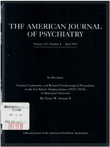Application of DSM-III-R criteria for major depressive episode to elderly subjects with and without dementia
Abstract
OBJECTIVE: The aim of the present study was to see how DSM-III-R criteria for a major depressive episode functioned in a representative sample of elderly subjects with and without dementia. METHOD: Data were used from a population-based study of individuals 75 years old or older living in Stockholm. Subjects were screened for dementia by using the Mini-Mental State. Subjects with scores of 23 or lower as well as age- and sex-matched subjects with scores of 24 or higher were given a medical examination. Dementia was diagnosed according to DSM-III-R and staged for severity by using the Washington University Clinical Dementia Rating Scale. The Comprehensive Psychopathological Rating Scale was used to record symptoms of depression, which were then classified according to DSM-III-R criteria for a major depressive episode. Data on depressive symptoms were available for 643 individuals: 213 with and 430 without dementia. A principal component analysis was carried out on the nine symptoms from criterion. A for a major depressive episode. RESULTS: The depressive symptoms clustered into two groups: mood disturbance and motivation disturbance. The mood disturbance symptoms were most frequent in subjects with mild dementia and less frequent in those with more severe dementia; the subjects with the most severe dementia had the highest rates of motivation disturbance symptoms. CONCLUSIONS: The different manifestations of depression in elderly patients with and without dementia should be taken into account when making the diagnosis of major depression. Further research is needed on the manifestations of depressive symptoms in the elderly in order to validate the diagnostic criteria.
Access content
To read the fulltext, please use one of the options below to sign in or purchase access.- Personal login
- Institutional Login
- Sign in via OpenAthens
- Register for access
-
Please login/register if you wish to pair your device and check access availability.
Not a subscriber?
PsychiatryOnline subscription options offer access to the DSM-5 library, books, journals, CME, and patient resources. This all-in-one virtual library provides psychiatrists and mental health professionals with key resources for diagnosis, treatment, research, and professional development.
Need more help? PsychiatryOnline Customer Service may be reached by emailing [email protected] or by calling 800-368-5777 (in the U.S.) or 703-907-7322 (outside the U.S.).



